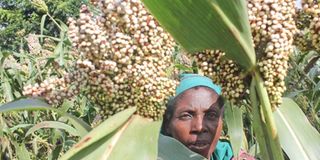Indigenous crops can boost hunger fight

Ms Syprose Atieno inspects millet at her farm in Sidho, Muhoroni, of Kisumu County.
Majority of Kenyans are feeling the pinch of the high cost of living. With the prices of various commodities, especially basic items such as food going through the roof, many people are going hungry.
Statistics from the Kenya Agriculture Research Institute (Kari) show that consuming alternative crops can help to improve the country’s food security status and also save the Exchequer billions of shillings spent on the importation of foodstuff.
In addition, indigenous foods are increasingly recognised as a healthy, sustainable cost-effective option to address micronutrient deficiencies that affect many.
Health experts comment that, indigenous vegetables are a good source of vitamins, which many people in urban areas lack and so spend a lot of money on supplements to replace them.
Examples of indigenous foods include millet, pumpkin, sweet potatoes and cassava.
These foods can do as alternative sources of nutrients, instead of depending on genetically modified and exotic foods. They do well even in the dry season since they are all-season foods.
It will be prudent of Kenyans to embrace indigenous food crops to fight against hunger.
First, the government should make sure that affordable seeds for indigenous crops are distributed to as many people as possible in a bid to increase their acreage. That will help to boost food security in the country.
Secondly, farmers should be supported to use modern methods of farming and preparation of their lands for farming. This will help them to apply irrigation so as to plant indigenous food crops all year round.
Thirdly, the State should stop spending a lot of money in importing exotic foods and, instead, support local farmers to practise farming of indigenous crops. Our farmers are capable of producing enough food but lack the necessary support.
Lastly, the Ministry of Agriculture should create awareness of, and educate people on, indigenous crops so that they can embrace them. Perhaps, the food security in Kenya will improve.
Constantine Sifuna, Migori




